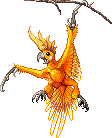Viewing 54THh

Father: Unknown
Unknown Pedigree
Hardiness: 38
Appearance: 3
Emerged: 2:05 06.12.2021
Matured: 19:26 07.12.2021
Despite their bright coloration, most Koleratakos are heard before they are seen. These nomadic birds fill the forest canopy with their shrill and incessant calls; they are highly communicative creatures who use their far-reaching voices to relay information across large flocks. They swing between branches using their opposable claws and lengthy arms, collecting nuts, seeds, and fruits that they crack open with ease between their formidable beaks. Koleratakos possess an unparalleled level of intelligence and memory, from their apparent understanding of mortality to their ability to craft and use simple tools in the wild. Lab-raised specimens have also been known to solve puzzles and can even assign meaning to basic words and sentences. But with this intellect comes a destructively mischievous nature. In the wild, Koleratakos will strip trees of leaves, bark, and branches, as well as harassing other animals seemingly for sport. In captivity, they will grab at any moving object within their reach, taking visible pleasure in destroying clothes, equipment, and furniture with their sharp talons. Angering or neglecting these temperamental birds should be avoided at all costs, as they are infamous for their tantrums—many a scientist has returned from lunch to find their laboratory completely torn to bits by a spiteful Koleratako.
The creatures that dwell in this rather desolate world still display some diversity in appearance, eating habits, and social behavior. Whether they have fur or feathers, skin or scales, their unique genetic makeup allows for a variety of colors and markings within each species. Despite limitations in food sources, herbivores, omnivores, and carnivores are all present in the food chain, and each species requires specialized care within a laboratory. Although the artificial setting of housing units and breeding pods precludes most opportunities to study true interspecific behavior, the interactions within and between species has been studied extensively in the wilderness by scientists daring enough to venture beyond the outpost’s walls.
